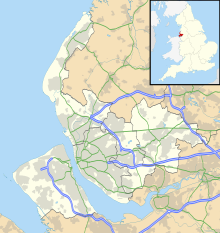| Site of Special Scientific Interest | |
 | |
 | |
| Location | Merseyside |
|---|---|
| Grid reference | SJ338815 |
| Coordinates | 53°19′52″N 2°59′42″W / 53.331°N 2.995°W / 53.331; -2.995 |
| Interest | Biological |
| Area | 53.2 hectares, 131.5 acres (532,000 m) |
| Notification | 1979 / 1983 |
| Natural England website | |
Brotherton Park and Dibbinsdale Local Nature Reserve informally known as Dibbinsdale is a combined park and local nature reserve managed by the Metropolitan Borough of Wirral and located in Bromborough, Merseyside, England.
History
Dibbinsdale takes its name from the River Dibbin which flows through the area. It is thought to have formed part of the boundary in the 10th and 11th centuries between the Norse colony in Wirral, to the north and west, and Anglo-Saxon Mercia to the east and south. After the Norman Conquest, the whole area became part of the Hundred of Wirral. In the 1800s the land on which Brotherton Park resides was part of an estate called 'Woodslee', this estate was bought in 1866 by a Liverpool Merchant called Robert Rankin who built 'Woodslee' house on the site as a wedding present for his daughter. The estate comprised Woodslee, servants cottages, a lake, stables, coach house, a walled garden and formal gardens with a rockery. At some stage it was sold William Johnston of Liverpool who is listed as living there in the 1901 Census. In 1919 the estate was bought by Lord Brotherton, an industrialist and member of parliament who donated the estate to the council in the 1930s, by the 1940s the house had become dilapidated and was demolished. In 1978 Brotherton Park and Dibbinsdale was designated a local nature reserve owing to the ancient woodland and became a single entity with much of Dibbinsdale donated by the Lancelyn Green family.
Brotherton Park
Brotherton Park is an urban park with an informal grassed area for recreation, dog walking and picnicking.
Dibbinsdale Local Nature Reserve
Dibbinsdale is a local nature reserve with a woodland valley which is an example of ancient woodland in the Merseyside area. It is also a Site of Special Scientific Interest.
Facilities
The park has woodland walks, nature trails, a meadow, historic woodland, wetland habitats, a small unmanned visitor centre, a rangers office, toilets and a free car park.
References
- Stephen J. Roberts, A History of Wirral, 2002, ISBN 978-1-86077-512-3
- Local History Archives-Dibbinsdale Local Nature (PDF), Metropolitan Borough of Wirral.
- "Woodslee History". Friends of Dibbinsdale. Retrieved 16 March 2020.
- ^ "Brotherton Park and Dibbinsdale Local Nature Reserve". Wirral Council. Retrieved 16 March 2020.
- "Dibbinsdale". Local Nature Reserves. Natural England. Archived from the original on 4 March 2016. Retrieved 4 August 2013.
- "Dibbinsdale citation" (PDF). Sites of Special Scientific Interest. Natural England. Archived from the original (PDF) on 24 October 2012. Retrieved 4 August 2013.
- "Map of Dibbinsdale". Sites of Special Scientific Interest. Natural England. Retrieved 4 August 2013.
External links
- Metropolitan Borough of Wirral: Brotherton Park & Dibbinsdale LNR
- Metropolitan Borough of Wirral: Dibbinsdale SSSI
- Metropolitan Borough of Wirral: Nature Conservation
- Steven Round Bird Photography - Many wild bird images from Dibbinsdale
| Sites of Special Scientific Interest in Merseyside | |
|---|---|